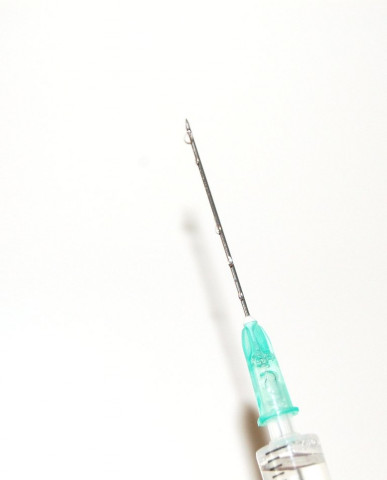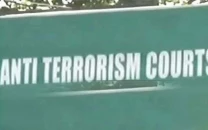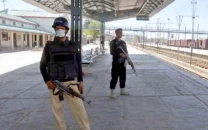Epidemic update: No swine flu in Multan, says Rafique
People advised to visit hospital if symptoms appear.

File photo of an injection. PHOTO: FILE
“There is no swine flu in Multan,” Salman Rafique, adviser on health to the chief minister said on Thursday.
He was talking to media at Nishtar Medical Institute during a visit to Multan to clarify the nature of the disease that has claimed the lives of three patients at Nishter Hospital over the past weeks. Ten people have been quarantined in the Alienation Ward 8 of the hospital.
Previously, blood samples sent to the National Institute of Health had tested positive for swine flu. Health officials of Multan and Dera Ghazi Khan had then declared a high alert.
Rafique, however, said that the patients had been suffering from Influenza A (H1N1) virus. He said this type of influenza was seasonal.
He urged people to visit the hospital if they experienced symptoms of seasonal influenza instead of trying to treat it themselves.
Health Secretary Babar Hayat Tarrar explained that swine flu was a strain of the Influenza A (H1N1) virus. He said the disease contracted by the patients was seasonal, viral and highly contagious.

Rafique said the government was using all its resources to control the outbreak effectively.
“Two of the suspected patients are in critical condition and on ventilators at the hospital...health authorities are taking all precautionary measures to prevent their relatives from contracting the disease,” Rafique said.
A report on blood samples of 200 birds from Multan and Dera Ghazi Khan has been kept confidential the Livestock Department. Health officials of Multan and Dera Ghazi Khan had previously suggested that some birds in the region might have carried the virus.
Rafique also said that the government attached great import to public health, as was reflected in the increase of Rs80 billion in the health budget compared to the previous year.
He said the government had also recruited 2,800 doctors who would be appointed at rural health centres and basic health units in south Punjab. On the subject of dengue fever, Rafique said the government had managed to control the disease within two years.
Rafique also said in the first phase the government was going to launch health insurance cards in Rajanpur, Layyah, Chakwal and Hasilpur. This will extend the best possible health facilities to the poor.
He also said that the government had taken notice of incidents of acid violence in south Punjab and was doing its best to prevent such occurrences. He said the perpetrators of such incidents will be prosecuted.
Nishter Medical Institute Principal Dr Sami Akhtar, Health Eexecutive District Officer Dr Iftikhar Qureshi and Nishter Medical Superintendent Dr Aashiq Malik were present on the occasion.
Published in The Express Tribune, March 7th, 2014.



















COMMENTS
Comments are moderated and generally will be posted if they are on-topic and not abusive.
For more information, please see our Comments FAQ